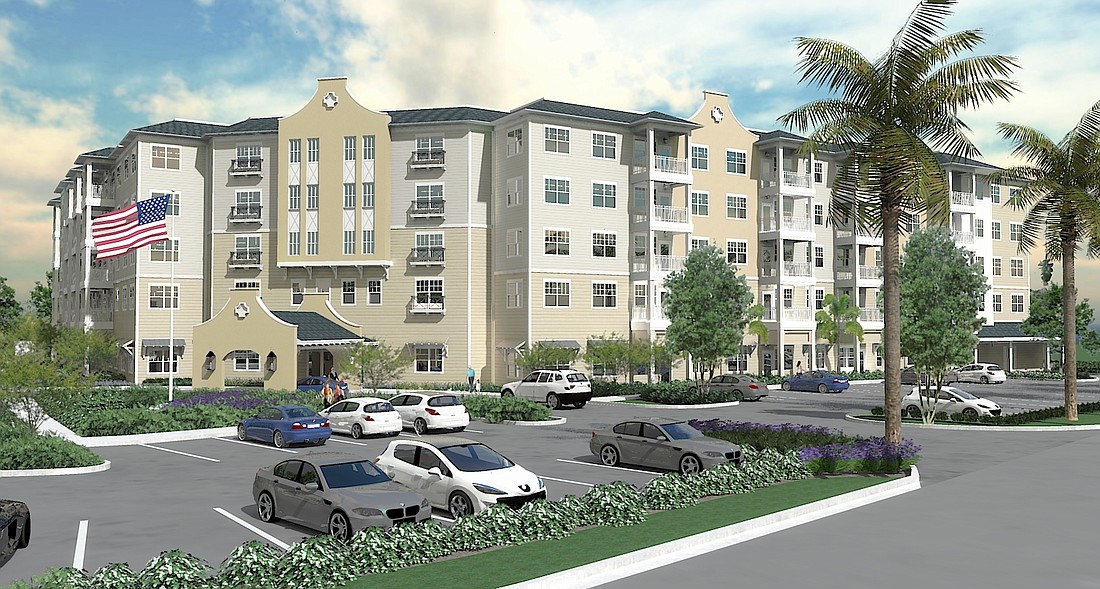Even as pandemic-inspired declines in occupancies and hikes in operating costs are prompting some investors to reconsider senior housing purchases, a Boca Raton-based firm that specializes in the sector is accelerating its acquisitions throughout the region.
Since the start of the COVID-19 health crisis in March, an affiliate of Kayne Anderson Capital Advisors L.P. has spent about $250 million to buy a half dozen independent living, assisted living facilities and nursing homes from Naples to Tampa, according to county property and other records.
Most recently, a Kayne Anderson entity earlier this month bought a 117-unit independent living project at Watermark at Trinity, in Pasco County, for an estimated $25 million.
The purchase of the five-story building, from a group comprising Gulf Coast Development, Rookis Development and Watermark Retirement Communities, came shortly after the project received its certificate of occupancy per an agreement with Kayne Anderson struck two years ago. In 2018, Kayne Anderson spent about $29 million to buy a three-story, 97-unit assisted living and memory care facility on the same campus.
“Buyers today are looking for new properties, with lots of modern amenities and clean designs, and especially for properties with experienced operators in place, because senior housing tends to be very operationally intense,” says David Kliewer, a senior director on the capital markets-senior housing team at commercial real estate brokerage Cushman & Wakefield, in Tampa, which represented the sellers in the Watermark transaction.
“All of those combined here to make this an attractive acquisition for the buyer.”
In addition to the 1960 Blue Fox Way property in Trinity, Kayne Anderson’s recent acquisitions have included five Aston Gardens-branded properties in Tampa, Sun City Center, Venice and Naples.
All five properties were purchased from affiliates of Welltower Inc., a Toledo, Ohio-based real estate investment trust that controls more than 580 senior housing properties nationwide, has more than $17 billion in total equity and generated revenue of $1.25 billion in the first quarter of this year, according to company data.
Aston Gardens at Pelican March, at 4800 Aston Gardens Way, in Naples, contains independent and assisted living as well as memory care units. Kayne Anderson bought it for $60.35 million, according to Collier County property records.
Aston Gardens at Tampa Bay, at 11702 Lake Aston Court, in Tampa, offers independent and assisted living units. Kayne Anderson’s purchase price was $43.22 million, Hillsborough County records show.
Aston Gardens at The Courtyards, at 231 Courtyard Blvd., in Ruskin, and the affiliated Aston Gardens at Sun City Center, at 1311 Aston Gardens Court, sold for a combined $63.58 million, Hillsborough County records show.
Aston Gardens at Pelican Pointe, at 1000 Aston Gardens Drive, in Venice, was purchased for $58.76 million, Sarasota County property records indicate.
Combined, the five properties were purchased for $226 million. Welltower bought all five in November 2015 for a collective $277 million, records show – an 18% premium to the amount Kayne Anderson paid.
Founded in 1984, Kayne Anderson specializes in energy and infrastructure investments, together with medical office buildings, student and senior housing, according to its website. In all, the firm had $31 billion in assets under management managed by five offices nationwide at the end of last year.
“Kayne’s investment philosophy is to pursue niches, with an emphasis on cash flow, where our knowledge and sourcing advantages enable us to deliver above average, risk-adjusted investment returns,” the company states on its website.
Kayne Anderson officials did not return multiple telephone calls for comment on its spate of recent Gulf Coast purchases.
The company’s spate of purchases comes as many operators and investors in the senior housing sector are experiencing coronavirus-related distress.
Welltower, in its first-quarter earnings report letter, says occupancies have declined because of the pandemic.
“Move-in volumes have decreased meaningfully on a year-over-year basis through the end of April,” Welltower Chairman and CEO Thomas DeRosa wrote to shareholders. “We continue to experience occupancy losses.”
And earlier this month, Griffin-American Healthcare REIT disclosed in a U.S. Securities & Exchange Commission filing that it was suspending monthly dividend distributions to stockholders in an effort to reserve cash amid the pandemic.
“The COVID-19 pandemic is first and foremost a healthcare crisis that has hit the healthcare sector directly,” the partnership between Griffin Capital Co. and American Healthcare Investors noted in its filing.
Occupancy in its 7,600 nursing home beds fell by 16.2% in the three months from March through May, the company says, even as operating costs have risen dramatically because of the pandemic.
Industrywide, assisted living facilities occupancy rates have fallen by more than 2.5% since March, while independent living units’ average occupancy has dropped nearly 2%, to 89.5% in May, according to data from the National Investment Center for Seniors Housing Care, a trade group.
“The data showing declines in occupancy at assisted living properties validates what property operators have said about the impact of COVID-19 on the senior housing sector,” says Beth Burnham Mace, the group’s chief economist, in a recent statement.
For now, at least, Kayne Anderson appears to be bullish on the sector in spite of the temporary performance struggles.
Cushman & Wakefield’s Kliewer says the current “pause” in investor activity isn’t reflective of the general interest among investors in senior housing.
Many savvy investors, including Prudential Financial investment arm PGIM Inc. and Bridge Investment Group, have been raising hundreds of millions of dollars in capital to acquire senior housing properties, Kliewer says.
“Right now we’re in a pause, but the investors we’ve been talking to are pretty firm in believing this is not going to shake the industry long term, in terms of transactions,” Kliewer says of the pandemic. “I think the reason for that is that the sector is still rather young, in comparison to offices and apartments, and may of the early entrants into the product type did extremely well, achieving (internal rates of return) well in excess of the general market.”
Kliewer also contends that longer term, the coronavirus pandemic could stem excess construction in the sector and enhance the value of existing Class A properties at a time when Baby Boomers – aged 56 to 84 – will be seeking out senior housing in greater numbers.
“COVID-19 will likely decrease the amount of new construction in senior housing, but the first crest of Baby Boomers will be reaching the point where they will be seeking residential help soon, so we expect that to be a real positive for the industry,” Kliewer says.






